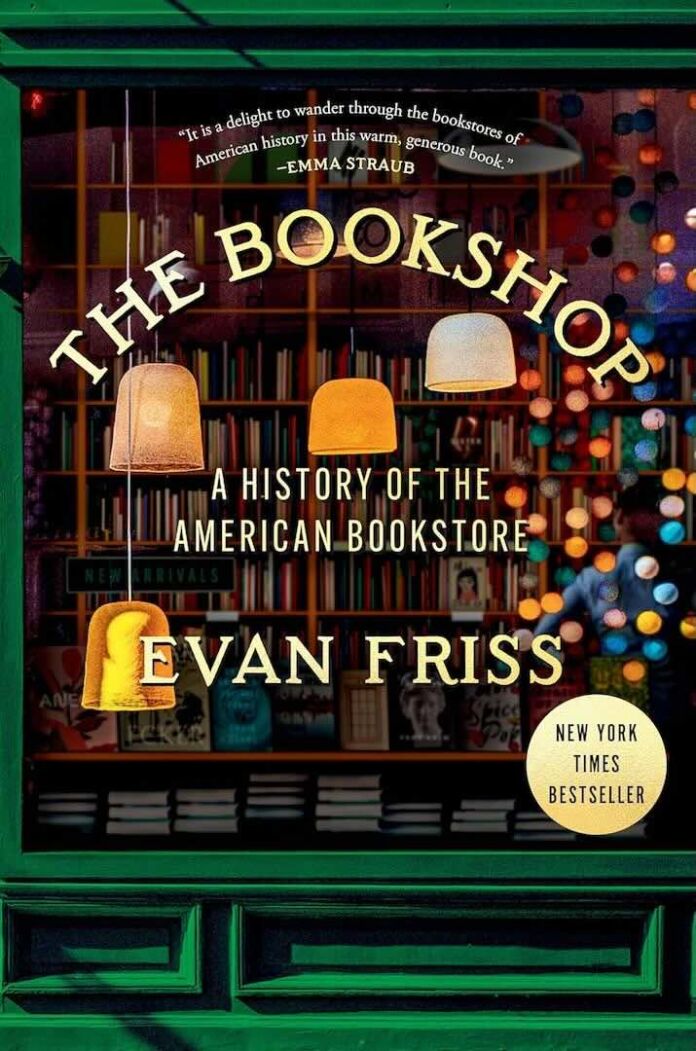There’s something magical about walking into a bookstore. The gentle creak of wooden floors, the soft rustle of pages being turned, the way sunlight filters through dusty windows to illuminate row upon row of spines – each one containing worlds waiting to be discovered. In The Bookshop: A History of the American Bookstore, historian Evan Friss captures this enchantment while meticulously documenting the evolution of these beloved cultural institutions from Benjamin Franklin’s time to the present day.
A Chronicle of Literary Temples
From the moment you open The Bookshop, it’s clear that Evan Friss isn’t just writing about retail spaces—he’s telling the story of American intellectual life through the lens of its literary gathering places. As a professor at James Madison University specializing in urban history, Friss brings both scholarly rigor and genuine affection to this comprehensive chronicle of how bookstores have shaped American culture, politics, and community life over more than two centuries.
Stories That Sell Books
What makes this book particularly engaging is Friss’s gift for storytelling. Rather than getting bogged down in dry historical facts, he brings legendary bookstores and their equally legendary proprietors vividly to life through carefully researched anecdotes and thoughtful analysis. We meet Frances Steloff of the Gotham Book Mart, who ran her shop like a literary salon and wouldn’t hesitate to bark at customers who mishandled her precious books. We learn about Marcella Hahner, the “Czarina” who transformed Marshall Field & Company’s book department into a cultural powerhouse. These portraits help readers understand how individual passion and personality have shaped the American bookstore landscape.
Highlights and Key Themes
Some of the book’s most compelling elements include:
- The evolution from Benjamin Franklin’s printer-publisher-bookseller model to today’s diverse ecosystem of indies, chains, and online sellers
- The role of bookstores in social movements, from the civil rights era’s Drum & Spear to Craig Rodwell’s pioneering Oscar Wilde Memorial Bookshop
- The complex relationship between commerce and culture, as exemplified by Marshall Field’s department store book section and Barnes & Noble’s expansion
- The impact of Amazon on traditional bookselling and the surprising story of Amazon’s own brief experiment with brick-and-mortar bookstores
Critical Analysis
While Friss’s research is impressively thorough and his writing engaging, there are moments when the book could dig deeper into certain aspects of bookstore history. The experiences of minority booksellers and the role of bookstores in immigrant communities, for instance, deserve more extensive exploration. Additionally, some readers might wish for more detailed analysis of the economics of bookselling across different eras.
However, these are minor quibbles in what is otherwise an outstanding work of cultural history. Friss has a particular talent for weaving together business history, cultural analysis, and human interest stories into a compelling narrative that will appeal to both casual readers and serious students of literary culture.
Writing Style and Accessibility
Friss’s prose is scholarly yet accessible, peppered with humor and keen observations that keep the pages turning. He has a knack for finding the perfect anecdote to illustrate larger historical trends, like the story of Judy the elephant signing books at Marshall Field’s, which exemplifies the creative marketing strategies bookstores have long employed to attract customers.
Contemporary Relevance
Perhaps most importantly, The Bookshop by Evan Friss helps us understand why these spaces matter now more than ever. In an age of digital disruption and online shopping, Friss makes a compelling case for the enduring value of physical bookstores as community spaces, cultural centers, and bastions of intellectual freedom.
The Future of Bookstores
The book concludes with a thoughtful examination of contemporary bookstores like Ann Patchett’s Parnassus Books in Nashville, demonstrating how independent bookstores are adapting to survive in the digital age. Friss neither sugarcoats the challenges facing modern bookstores nor succumbs to pessimism about their future.
Similar Works and Context
While The Bookshop is Evan Friss’s first book about literary culture, it builds on his previous works examining urban life and commerce, including The Cycling City and On Bicycles. Readers interested in this topic might also enjoy Laura J. Miller’s Reluctant Capitalists: Bookselling and the Culture of Consumption or Josh Clark Davis’s From Head Shops to Whole Foods: The Rise and Fall of Activist Entrepreneurs.
Final Verdict
The Bookshop by Evan Friss is an essential addition to the literature about American cultural history. While it occasionally leaves certain stones unturned, it succeeds brilliantly in its primary mission: documenting and celebrating the vital role bookstores have played in American life. Friss has created a work that will appeal to book lovers, history buffs, and anyone interested in understanding how these beloved institutions have shaped our cultural landscape.
Strengths:
- Engaging narrative style
- Rich historical detail
- Excellent use of primary sources
- Strong connection to contemporary issues
Areas for Improvement:
- Could explore minority experiences more deeply
- Some economic aspects could be analyzed further
- Occasional repetition in certain sections
This meticulously researched yet thoroughly engaging history reminds us that bookstores are more than just retail spaces—they’re vital cultural institutions that continue to shape our intellectual and social lives. In an era when many brick-and-mortar bookstores face existential challenges, Friss’s work serves as both a celebration of their past and a thoughtful consideration of their future.





